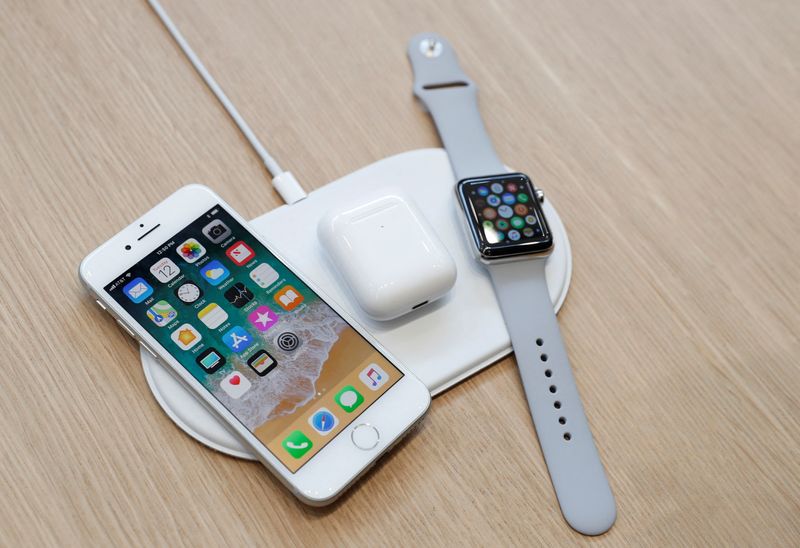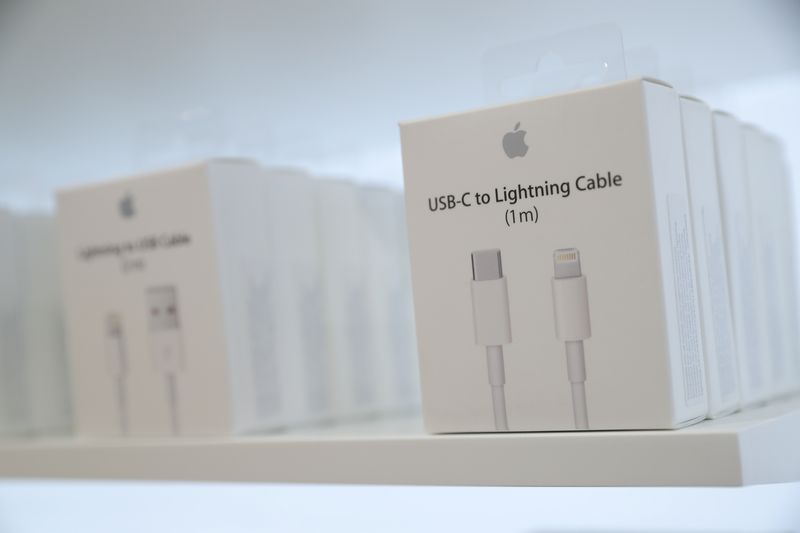By Francesco Guarascio
BRUSSELS (Reuters) -Apple will have to change the charger for its iPhones in the European Union from autumn 2024 to comply with new rules introducing a single charging port for most electronic devices.
The reform passed by an overwhelming majority in the European Parliament on Tuesday, the first of its kind anywhere in the world, potentially strengthens the EU's role as a global standard-setter on telephone technology. The vote confirmed an earlier agreement among EU institutions.
The new rules will make USB-C connectors used by Android-based devices the standard across the 27-nation bloc, forcing Apple (NASDAQ:AAPL) to change its charging port for iPhones and other devices.
It will also apply to laptops from 2026, giving manufacturers longer to adapt, although many already use USB-C.
Apple is expected to be the most affected of the big providers of electronic devices to European customers, although analysts say the impact could be positive if it encourages shoppers to buy the U.S. company's new gadgets instead of ones without USB-C.
Shares in European semiconductor manufacturers rose on Tuesday after the vote, including those of Apple suppliers STMicro and Infineon.
The deal also covers e-readers, ear buds and other technologies, meaning it may also have an impact on Samsung (KS:005930), Huawei and other device makers, analysts said.
Apple, Samsung and Huawei were not immediately available for comment.
Under the reform, mobile phones and other devices sold after autumn 2024 will have to be compatible with the single charger, said Alex Agius Saliba, the EU lawmaker who steered the reform through the EU assembly. Old chargers will not be outlawed, however, so that customers can continue to use older models.
The large size of the EU market means the new rules may lead to changes in other countries.
GRADUAL PHASE-OUT
Saliba told a news conference that outlawing old chargers would have had a disproportionate impact on consumers and the environment, but noted that the change is expected to lead to a gradual phase-out of older products.
In total 13 categories of electronic devices will have to adapt by autumn 2024.
The Parliament extended the original proposal from the EU's executive Commission which covered only seven types of devices. Lawmakers also added laptops from 2026.
Apple has in the past warned that the proposal would hurt innovation and create a mountain of electronics waste.
The change had been discussed for years and was prompted by complaints from iPhone and Android users about having to switch to different chargers for their devices.
The European Commission has estimated that a single charger would save about 250 million euros ($247.3 million) for consumers.
Half the chargers sold with mobile phones in 2018 had a USB micro-B connector, while 29% had a USB-C connector and 21% a Lightning connector, which is used by Apple, a 2019 Commission study showed.
Apple is working on an iPhone with a USB-C charging port that could debut next year, Bloomberg reported in May.

The Commission has also been mandated by lawmakers to assess the possible regulation of wireless charging, but an EU official said no decision has been made yet, noting that the technology is not yet mature.
($1 = 1.0106 euros)
